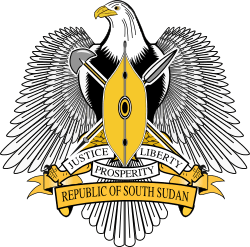National Legislative Assembly (South Sudan)
The National Legislative Assembly was established in 2011 by the interim constitution of South Sudan 2005. It was reconstituted as the Transitional National Legislative Assembly in February 2020. It is one of the two chambers comprising the Transitional National Legislature of South Sudan.
Transitional National Legislative Assembly | |
|---|---|
| Type | |
| Type | |
| History | |
| Founded | 2011 |
| Leadership | |
Speaker | Obuch Ojok since 16 December 2019 |
| Seats | 400 |
| Elections | |
Last election | Sudanese general election, 2010 (elections to predecessor body) |
| Meeting place | |
| Ministries Complex Juba South Sudan | |
 |
|---|
| This article is part of a series on the politics and government of South Sudan |
| Constitution |
|
|
Administrative divisions |
|
|
Related topics |
Composition
2011-2020
Following independence in 2011, the National Legislative Assembly comprises:
- all persons who were members of the Southern Sudan Legislative Assembly; and
- all South Sudanese who were members of the National Assembly of Sudan, by virtue of their membership in that Assembly.
Members of the Council of Ministers who are not members of the National Legislative Assembly must participate in its deliberations but do not have the right to vote. Persons who wish to become members of the National Legislative Assembly must fulfill the eligibility requirements set down by the Constitution for membership of the National Legislature.
2020-present
As a result of a peace agreement that came into effect in February 2020, the National Legislative Assembly was reconstituted as the Transitional National Legislative Assembly with 400 members. [1] The membership is as follows:
- 332 members of the former National Legislative Assembly
- 50 members representing the armed opposition
- 17 members representing other parties and groups
- 1 member representing former detainees
Speakers of the National Assembly
| Name | Took office | Left office | Notes |
|---|---|---|---|
| James Wani Igga | 2011 | August 2013 | [2][3] |
| Manasseh Magok Rundial | August 2013 | 4 August 2016 | [4][5] |
| Anthony Lino Makana | 4 August 2016 | 8 December 2019 | [6][5] |
| Obuch Ojok | 16 December 2019 | Incumbent | [7] |
Role
The Transitional National Legislative Assembly exercises the following functions:[8]
- overseeing the performance of the National Government institutions;
- approving plans, programmes and policies of the National Government;
- approving budgets;
- ratifying international treaties, conventions and agreements;
- adopting resolutions on matters of public concern;
- summoning Ministers to answer questions of members of the Assembly on matters related to their ministries;
- interrogating Ministers about their performance or the performance of their ministries;
- approving appointments as required by the Transitional Constitution or the law;
- casting a vote of no confidence against the Vice President and any Minister;
- enacting legislation to regulate the conditions and terms of service of the Judiciary and its oversight mechanisms; and
- performing any other function as determined by the Transitional Constitution or the law.
See also
- Southern Sudan Legislative Assembly – the preceding assembly 2005–2011
References
- https://www.sudantribune.com/IMG/pdf/final_proposed_compromise_agreement_for_south_sudan_conflict.pdf
- Badiey, Naseem (2014). The State of Post-conflict Reconstruction: Land, Urban Development and State-building in Juba, Southern Sudan. ISBN 978-1-84701-094-0.
- "Elections for speakership should be through secret ballot – nominee". May 25, 2016.
- Johnson, Hilde F. (2016-06-09). South Sudan: The Untold Story from Independence to the Civil War. ISBN 978-1-78672-005-4.
- "thenationmirror.com - thenationmirror Resources and Information". www.thenationmirror.com.
- "IPU PARLINE database: SOUTH SUDAN (Al-Majlis Al-Tachirii), General information". archive.ipu.org.
- "South Sudan's parliament endorses new speaker". Radio Tamazuj. Retrieved 2019-12-16.
- Art. 57 of the Interim Constitution of the Republic of South Sudan